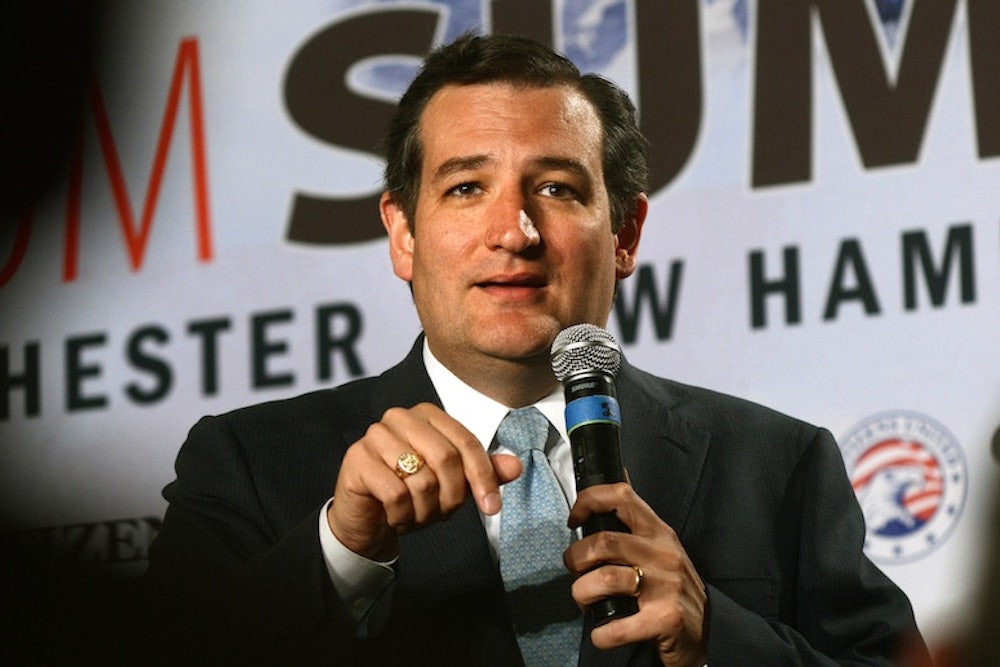Senator Rand Paul, Mike Huckabee, and Newt Gingrich threw the usual, now-rotting red meat to the GOP base at the inaugural Freedom Summit in New Hampshire last weekend, where sponsors Americans for Prosperity and Citizens United began vetting conservative candidates for president in 2016. But one line in Senator Ted Cruz’s speech crystallized just how disconnected the Republican worldview is today. “Where we are right now is eerily, uncannily, like the late 1970s," he said. "You had Jimmy Carter in the White House and you had the same failed economic policies. Out-of-control spending, taxes, and regulation produced the exact same misery and stagnation. You had the same feckless foreign policy and the same naiveté making the world a much more dangerous place.”
The audience, mostly older whites whose political identities were forged in the economic traumas of the 1970s, loved it. But to compare America in the 2010s to America in the 1970s fundamentally misreads our current problems and shows how the GOP will continue to pander to its ever-shrinking base while ignoring the realities that everyone else, especially the young, see today.
Our economy is nothing like it was in the 1970s, and its fundamental problems are the exact opposite. In the late '70s, the misery index, measured by adding the inflation and unemployment rates together, was at 16 percent. The economy was heating up so fast that the last years of the 1970s saw inflation rates of 10 percent, with high interest rates as well. The Federal Reserve responded by raising interest rates, deliberately causing a recession, in order to lower inflation.
Today, the economy is so lukewarm that inflation is nonexistent. Both interest rates and inflation are at some of their lowest rates in decades, reflecting the fact that there isn’t enough demand in the economy to bring about full employment. The Federal Reserve, in fact, is doing the opposite of what it once did. It’s lowered interest rates to fight a recession, while debating how it could raise inflation as a possible way of jumpstarting investment and a stronger recovery.
Instead of weak or collapsing corporate profits, as happened in the '70s, corporate profits today are at all-time highs. In the '70s, labor was strong enough that Federal Reserve Chair Paul Volcker would carry a card listing wage gains that unions had won in settlements, because his goal was to reverse these gains. Only a sadist or someone unfamiliar with how the economy is doing would think that large wage gains, gains which have stagnated since the late 1970s, are the problem the economy faces today.
Beyond the economy, in the 1970s there was a bipartisan effort to deregulate markets ranging from transportation to finance to energy, an effort that began under Carter before it took off under President Ronald Reagan. But the regulatory landscape has done a complete 180 since then: Here in the early twenty-first century, there's an effort to re-regulate markets to restore accountability and stability. The financial sector, seen in the '70s as being smothered by regulations, now needs a system of rules that prevents it from being Too Big To Fail and above the law. The energy industry is cooking the earth. Telecommunications are controlled by ever-fewer corporations. The expansion of for-profit industries into core social goods, like college, has led to crony enterprises. If society is going to put any of these problems into check, we’ll need a different worldview from the market obsession of the late 1970s and early 1980s.
In foreign policy, the fact that Republicans want to resume an aggressive anti-Soviet stance as pioneered by neoconservatives in the 1970s is even more obtuse. Most of the 2000s were spent trying to point the anti-Soviet stance at Al Qaeda and the Middle East. As Charles Krauthammer wrote in his 2004 neoconservative manifesto, "Democratic Realism," “we find ourselves in a similar existential struggle but with a different enemy: not Soviet communism, but Arab-Islamic totalitarianism, both secular and religious. Bush and Blair are similarly attacked for naively and crudely casting this struggle as one of freedom versus unfreedom, good versus evil.” The idea that Al Qaeda posed a Soviet-level threat to the U.S. was ridiculous in 2004, and ten years later it’s an even weaker way of understanding the changes in the world and America's role in it. The neoconservative policy of “preemption and unilateralism” failed in Iraq, and voters aren’t likely to see it as the future.
Cruz concluded his speech by endorsing a return to the conservative, grassroots activism that brought Reagan to office. But it’s impossible to disentangle that spirit from the specific crises of the '70s. Those crises, be it the Cold War or the buckling of the Keynesian economy under inflation, are clearly not what we face today. Other crises that bound the conservative coalition together in the 1970s, like the “urban crisis” of crime and hollowing urban cores, are also empty signifiers in an era of mass incarceration, low crime, and gentrification. But since the conservative strategy is to double down on its base of aging voters, it’ll keep hammering on these ideas—even though they reflect a world that no longer exists.
